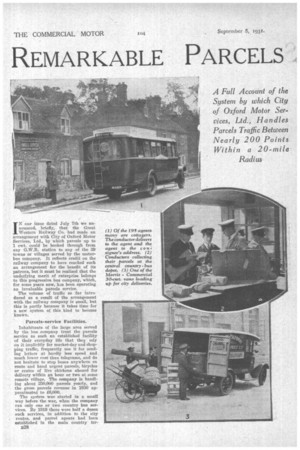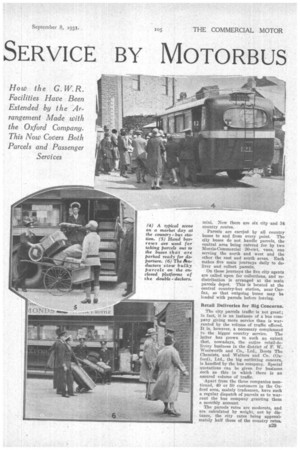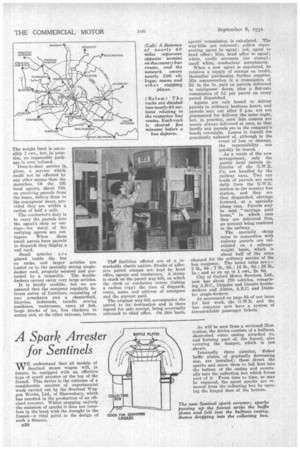REMARKABLE PARCELS SERVICE BY MOTORBUS
Page 42

Page 43

Page 44

If you've noticed an error in this article please click here to report it so we can fix it.
IN our iSsue dated duly 7th we annomieed, briefly, that the Great Western Railway Co. had made an arrangement with City of Oxford Motor Services, Ltd., by which parcels Alp to 1 cwt, could be booked through from any G.W.R. station to any of the 39 towns or villages served by the motorbus company. It reflects credit on the railway company to have reached such an arrangement for the benefit of its patrons, but it must be realized that the underlying merit of enterprise belongs to this progressive bus company, which, for some years now, has been operating an invaluable parcels service.
The volume of traffic so far introduced as a result of the arrangement with the railway company is small, but this is partly because it takes time for a new system of this kind to become known.
Parcels-service Facilities.
Inhabitants of the large area served by the bus company treat the parcels service as such an established facility of their everyday life that they rely on it implicitly for market-day and shopping traffic, frequently use it for sending letters at hardly less speed and much lower cost than telegrams., and do not hesitate to stop buses anywhere en route and hand urgent parcels, bicycles or crates of live chickens aboard for delivery within an hour or two at some remote village. The company is handling about 250,000 parcels yearly. and the gross parcels revenue in 1930 approximated to 16,000.
The system was started in a small way before the war, when the company ran only one or two country bus ser vices. By 1919 there were half a dozen such services, in addition to the city routes, and parcel agents had been established in the main country ter mini. Now there are six city and 34 country routes.
Parcels are carried by all country buses to and from every point. The city buses do not handle parcels, the central area being catered for by two Morris-Commercial 30-cwt. vans, one serving the north and west and the other the east and south areas. Each makes five main journeys daily to deliver and collect parcels.
On these journeys the five city agents are called upon for collections, and redistribution is arranged at the main parcels depot. This is located at the central country-bus station, near Carfax, so that outgoing buses may be loaded with parcels before leaving.
Retail Deliveries for Big Concerns.
The city parcels traffic is not great; in fact, it is an instance of a bus company giving more service than is warranted by the volume of traffic offered. It is, however, a necessary complement to the bigger country service. The latter has grown to such an extent that, nowadays, the entire retail-delivery business in the district of P. W. Woolworth and Co., Ltd., Boots The Chemists, and Walters and Co. (Oxford), Ltd., the big outfitting concern, is handled by the bus company. Special quotations can be given for business such as this in which there is an assured volume of traffic.
Apart from the three companies mentioned, 40 or 50 customers in the Oxford area, mainly tradesmen, have such a regular dispatch of parcels as to warrant the but company granting them a monthly account.
The parcels rates are moderate, and are calculated by weight, not by diptame, the city rates being approximately half those of the country rates.
The weight limit is ostensibly 1 cwt., but, in practice, no reasonable package is ever refused.
Door-to-door service is, given, a service which could not be effected by any other means than the motorbus. Of the 195 local agents, about 180, on receiving parcels from the buses, deliver them to the consignees' doors, provided they are within a radius of half a mile.
The conductor's duty is to carry the parcels into the agent's slier) or cottage—for many of the outlying agents are cottagers. When these small agents have parcels to dispatch they display a call card.
Small articles a r e placed inside the bus on racks, and larger articles are loaded on to the specially strong singledecker roof, properly secured and protected by a tarpaulin. The doubledeckers cannot carry very large articles.
It is hardly credible, hut we are assured that the company regularly delivers suites of furniture, consisting of two armchairs and a chesterfield, bicycles, bedsteads, treadle sewing machines, mattresses, cases of fish, large .blocks of ice, live chickens in crates and, at the other extreme, letters. Thi facilities offered are of a remarkably elastic nature. Stocks of adhesive parcel stamps are kept by head office, agents and conductors. A stamp is stuck on the parcel way-bill, on which the clerk or conductor enters (taking a carbon copy) the time of dispatch, route, name and address of consignee and the amount paid.
The original way-bill accompanies the parcel to its destination and is there signed for safe receipt, being eventually returned to chief office. On this basis, agents' commission is calculated. The way-bills are coloured; yellow representing agent to agent; red, agent to head office ; blue, head office to agent; white, credit accounts (no stamp) ; small white, conductors' acceptances.
When a new agent is appointed, he receives a supply of stamps on credit, thereafter purchasing further supplies. His remuneration is a commission of 2d. in the 1s. paid on parcels delivered to consignees' doors, plus a Sat-rate commission of 1d. per parcel on every parcel dispatched.
Agents are only hound to deliver parcels in ordinary business hours, and parcels sent out after 5 p.m. are not guaranteed for delivery the same night, but, in practice, even late corners are nearly always delivered at once, so that hardly any parcels are in the company's hands overnight. *Losses in transit are practically unheard of, although in the event of loss or damage, the responsibility can quickly be traced.
As a result of the new arrangement, only the purely local parcels deliveries of the G.W.R. Co. are handled by the railway vans. Two van loads of parcels. are sent daily from the G.W.R. station to the country bus station, and they are then dispatched, carriage forward, at a specially cheap rate. Parcels may be sent "carriage paid home," in which case they are delivered free, an account being rendered to the railway.
The specially cheap rates in connection with railway parcels are calculated on a mileageweight basis, which is about half of the rates charged for the ordinary service of the bus company. The latter rates are :— 3 lb., 4d.; 7 lb., 6d.; 14 lb., &L; 28 lb., 1s.; and so on up to 1 cwt., 2s. 6d.
City of Oxford Motor Services, Ltd., now has about 170 vehicles, comprising A.E.C., Daimler and Dennis doubledeckers and Albion, A.E.C. and Daimler single-deckers. As announced on page 83 of our issue for last week, the G.W.R. and the bus company now have a system of interavailable passenger tickets.




























































































